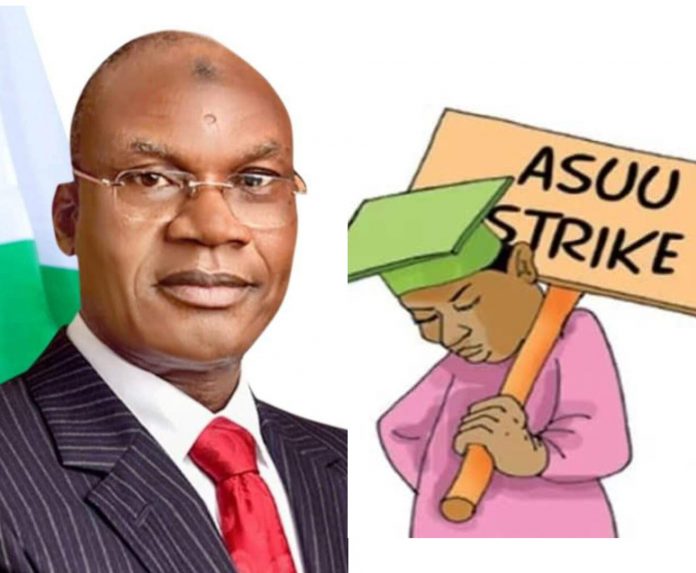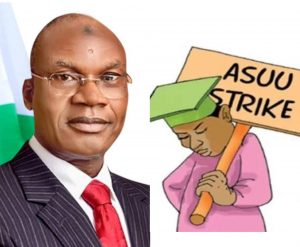Minister of Education, Prof. Tahir Mamman, ASUU strike
The Academic Staff Union of Universities (ASUU) had embarked on strike16 times in the last 25 years. Again, ASUU is beating another round of war drum. The last it did was in 2022. It’s a matter of significant importance that the 2009 agreements have serially been breached by the federal government, a reality that has subsequently culminated to a lot of strikes after negotiations upon negotiations have failed to address the core issues raised by ASUU.
It would seem the last industrial action which took place in 2022 by ASUU failed to infuse significant lessons on the federal government.
NATIONAL WAVES like many Nigerians are of the view that the ongoing war drum which has already been signposted by a 21-day ultimatum given to the federal government by ASUU could have been avoided if the authorities have paid attention to the issues raised instead of the usual cavalier attitude of procrastination and war of attrition on the part of the government.
It would seem the logic of ASUU and the perspective of many commentators that the lack of attention on the part of the authorities stem from the fact that many of the children of top political decision makers and the elites school abroad, and therefore immuned from the rot in tertiary education in Nigeria.
No serious government can afford to play the game of Russian roulette with education of its citizens, since it’s globally accepted that same is the bedrock of economic development.
It’s a matter of regret that now the drumbeat of yet another industrial action has reached feverish pitch.
After the expiration of 14-day ultimatum issued on August 18 2024, ASUU waited for a positive response from the federal government; but nothing was forthcoming.
ASUU had last week issued a fresh 21-day ultimatum for the federal government to resolve lingering issues affecting lecturers.
Among other demands, ASUU wants the conclusion of the renegotiation of the 2009 FGN/ASUU Agreement premised on the Nimi Briggs Committee’s Draft Agreement of 2021, as well as the payment of salaries withheld due to the union’s eight-month industrial action in 2022.
ASUU President, Emmanuel Osodeke in a statement last Wednesday expressed dismay and frustration with the government’s attitude of non commitment and delay tactics, adding that the actions had already ignited a crisis in the public university system.
The statement read, “In view of the foregoing, ASUU resolves to give the Nigerian Government another 14 days, in addition to the earlier 21 days, beginning from Monday, September 23, 2024, during which all the lingering issues must have been concretely addressed to the satisfaction of the membership of the union.
“The union should not be held responsible for any industrial disharmony that arises from the government’s failure to seize the new opportunity offered by ASUU to nip the looming crisis in the bud.”
ASUU has also mentioned the non release of unpaid salaries for staff on sabbatical, part-time, and adjunct appointments affected by the Integrated Payroll and Personnel Information System, and the payment of outstanding third-party deductions such as check-off dues and cooperative contributions.
The union has also consistently called for funding for the revitalization of public universities and the payment of Earned Academic Allowances partly captured in the 2023 budget.
Other highlights of demands include the proliferation of universities by federal and state governments, the implementation of the reports of visitation panels to universities, the reversal of the illegal dissolution of governing councils, and the adoption of the University Transparency and Accountability Solution as a replacement for IPPIS.
Mr. Abiodun Adeniyi, a Professor and Dean, School of Post Graduate Studies, Baze University, Abuja says ASUU demands are extremely genuine. “If you examine them critically. I also know that the Minister of Education, Prof. Tahir Mamman is an individual that would ordinarily do all within his powers to prevent the strike. But if he fails, then the forces preventing the attention to ASUU demands are obviously bigger than him. The government should try some more to meet ASUU at a point, because another strike will be one too many. We should avert it”.
Professor Adeagbo Moritiwon, a political scientist says the federal government is treating tertiary education with levity, saying the idea is to collapse public universities education in Nigeria, after all, “their children are schooling abroad. He wondered why government has not taken the long hiatus as from August 22 when the first 14- day ultimatum was issued to call ASUU and resolve the issues.
Dr. Abolarin Bodunrin of University of Birmingham who left the shores of the country last year said it would not be an exaggeration to say that public universities education has collapsed in the country. He says ASUU has consistently called attention to it, but the government thinks ASUU is demanding too much. They are more interested in spending money on public office holders than making education works. I left the country because I couldn’t stomach the mess any longer.”
In August when the first ultimatum was issued, the federal ministry of Education, said the federal government was working to avert another strike by the Academic Staff Union of Universities, but did not take concrete action.
Rising from its National Executive Council meeting, held at the University of Ibadan on August 18-19, ASUU had given the Federal Government a 21-day ultimatum to meet its outstanding demands or lecturers would go on strike.
Further speaking at a press briefing at the Michael Okpara University of Agriculture Umudike, Abia State, ASUU President, Prof. Emmanuel Osodeke, insisted that lecturers would be forced to embark on another strike except the Federal Government met their demands before the expiration of the 21-day ultimatum.
The spokesperson for the federal Ministry of Education, Folashade Biriowo, told journalists
“The ministry is working on it.”
Recall that the minister of Education, Prof. Tahir Mamman, on June 26, invited ASUU for a meeting to deliberate on the lingering issues affecting universities and to avert the planned strike.
The ASUU President, who spoke on the outcome of the meeting, said the agreements reached with the Federal Government had not been implemented. But nothing has come out since then to justify the patience of ASUU.
He said, “The Academic Staff Union of Universities held its National Executive Council meeting at the University of Ibadan, Ibadan, between Saturday, 17th and Sunday, 18th August 2024, where the union undertook a comprehensive review of the outcomes from its engagements with the federal and state governments on various outstanding issues that have encumbered the development of Nigerian universities and hindered university workers’ drive to reposition them for the transformation of Nigeria.
“The meeting further appraised worsening living and working conditions in our universities and the nation at large.The meeting received alarming reports on the failed promises of the government to address the lingering issues that forced the union to embark on the nationwide strike action of February-October 2022.
“Seasoned and experienced scholars have continued to flee to countries that are less resource-endowed, but where their expertise is better appreciated. Reports presented to NEC indicate that the government does not appreciate the enormity of the problem and the dire need to arrest the ugly trend with utmost urgency.
“Our union is worried that the government appears fixated on its self-serving approach of legalistic and bureaucratic arm-twisting.”
Osodeke said it was regrettable that “university issues, over which ASUU has been engaging the federal and state governments in the last one decade or so, are yet to be meaningfully addressed. These issues include review and signing of the renegotiated 2009 FGN-ASUU Agreement; impactful funding.”
“After extensive deliberations on the foregoing, among others, ASUU NEC, at its last meeting, resolved to condemn in strong terms the seeming refusal of the federal and state governments to decisively address all outstanding issues with ASUU, reject the slow pace of intervention by the Minister for Education in resolving the aforementioned issues, give the government a 21-day ultimatum to address all outstanding issues, and reconvene at the expiration of the 21 days’ notice to take an appropriate decision(s) as deemed necessary.”
The ASUU President, however, said the union was more interested in dialogue, while shoving off “ethnic suspicion, religious bigotry, plutocratic tendencies and such other practices that are inimical to our peaceful co-existence and collective happiness as a people of one nation.
Abdullah Muhammad, an emeritus professor of agronomy told NATIONAL WAVES that ” it’s quite unfortunate that another round of strike is coming at this period; this has happened because the federal government has not really taken serious the issue of education the way they take serious the issue of their election.”
At the expiration of the current ultimatum on October 20, ASUU has vowed to embark on indefinite strike if nothing is done to meet their demands.
Aside, the rhetoric on both sides, NATIONAL WAVES calls on the two parties to work out peaceful solutions to the lingering crisis as any industrial action at this time will throw the university education into avoidable crisis. Government should show more maturity for the sake of education, at the same time, ASUU should note that it can never be a win- win situation; it should be ready to make little concession to the federal government


